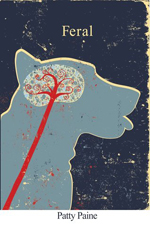Review | Feral, by Patty Paine
Imaginary Friend Press, 2012
 |
“A language of ideas,” writes Mark Doty, “is, in itself, a phantom language, lacking in the substance of worldly things, those containers of feeling and experience, memory and time.” In Patty Paine’s second chapbook, however, the reader finds not the language of ideas—though phantoms, internal and the projected external, emerge—but the language of things: of doll heads, wishbones, of escarole, scallions, tofu and taro. “We are instructed,” Doty continues, outlining the lodestar that poets of substance follow, “by the objects that come to speak with us, those material presences,” and those objects in Feral act as an inventory of legacy, totemic, yet domestic; cumbersome, yet comforting. Paine writes: “what isn’t / fastened [is] lost.”
But don’t expect the poems in Feral to merely itemize and grieve for losses. Don’t expect a book of lamentation or an emotionally paralyzed speaker, though the death of her mother and the dissolution of a romantic relationship together act as the clapper inside that tolls the bell. Instead, the chapbook concerns itself with the speaker’s release, however bittersweet, and the inventories, then, amount to links in the fence from which she frees herself:
an escape
folded into suitcases and hidden
under a marriage bed
The title then speaks not so much of a wild animal, though feral dogs and cats often figure in the poems, but more to the word’s precise denotation: a being or its offspring, once domesticated but now in a wild state:
A desert teaches
your body doesn’t belong
to you, it belongs to the wind
its breath at your ear, and weeping,
you do as it says, you lie
down on the shimmering sand.
Paine’s approach fulfills and also subverts our expectations of elegy, with notes that sound correctly though not with the same intonation, a little warmer in tone, reedier. Paine rearranges the tone from a familiar score: “this hunger, so raw, so large,” “when my fingers found them they sang,” or “our words turned / to ash” But the grace notes that lead up to these moments reveal the vital subjective experience of the poems’ speaker. “Summary of the Night You Left” may mislead us to expect an unremarkable (and perhaps mawkish) retelling of a dramatic situation, but Paine looks again to totems—objects—to ground and animate the emotional situation:
vanished: two
oranges one metronome
one earthenware ewer
left behind: a razor wire
of memory
Paine encounters her anxiety to reveal the things, the objects of a legacy—either given by the parent or a marriage—in order to release herself from the spiritual grip that once held the speaker but now holds her in. “We paused,” she writes in “Sound & Bearing,” “over rabbit bones (so perfect, so / small) They were / curiosity then not omen.”
Though the change that takes place here insinuates loss, it shows a speaker at her most enigmatic: the creature who, just having bolted through the open door, pauses in the yard, quivering, looking around, looking. ![]()
Patty Paine is the author of The Sounding Machine (Accents Publishing, 2012) and Elegy & Collapse (Finishing Line Press, 2005). She is the co-editor of Gathering the Tide: An Anthology of Contemporary Arabian Gulf Poetry (Ithaca Press, 2011). Paine is an assistant professor of English and assistant director of Liberal Arts & Sciences at Virginia Commonwealth University–Qatar. She is the founding editor of diode.